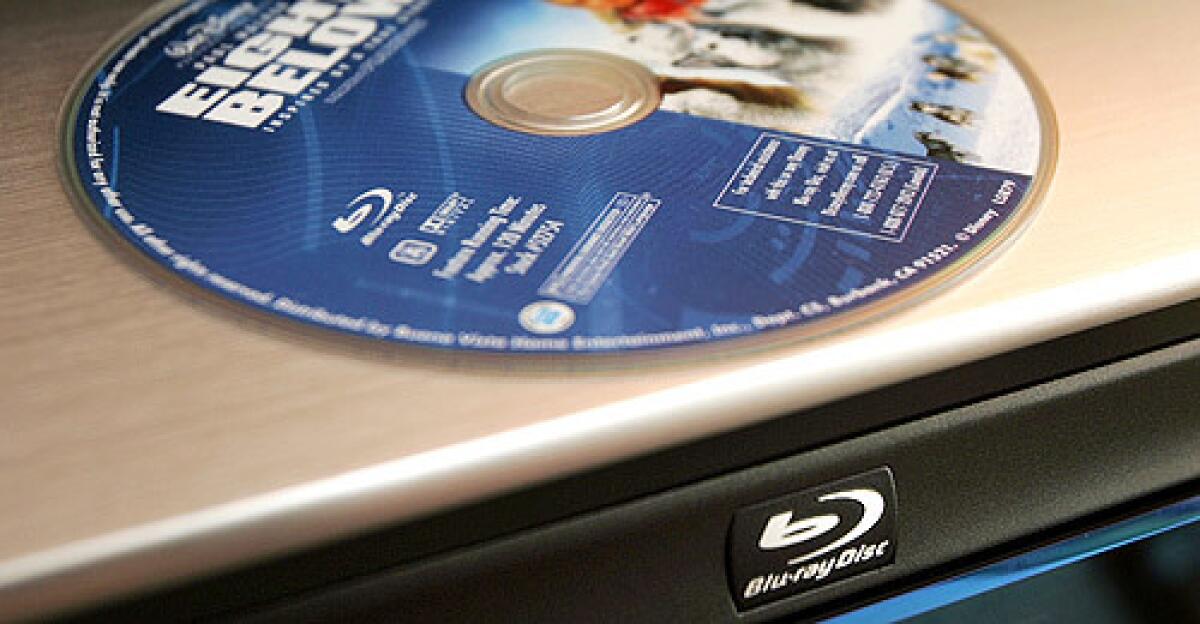DVD format war appears to be over

- Share via
The fuzzy future of high-definition DVD came into sharper focus Friday after Warner Bros. said it would release movies for the home video market exclusively on the Blu-ray disc format.
The decision, announced on the eve of the influential Consumer Electronics Show, delivers a de facto knockout punch to the rival HD DVD format backed by Toshiba Corp. and others now supported by only two of Hollywood’s six major movie studios.
It also averts a further costly format war that has been stymieing the growth of the next generation of DVD with promises of enhanced video images and digital audio to match the popularity of flat, big-screen television sets. For the first time, sales of movies on regular DVDs declined last year, jeopardizing a longtime and important source of profits for Hollywood. The studios hope the new, higher-quality format will spur consumers to restock their DVD shelves.
In addition to Warner Bros., studios supporting the Blu-ray format include News Corp.’s 20th Century Fox, Walt Disney Co., Sony Pictures and Metro-Goldwyn-Mayer. Taken together, they represent about 70% of the home video market. HD DVD is supported by General Electric’s NBC Universal, Viacom Inc.’s Paramount Pictures and the independent studio DreamWorks Animation.
“Expect HD DVD to die a quick death,” said Richard Greenfield, an analyst with Pali Research in New York, in a research note Friday.
Late Friday, the HD DVD group canceled a news conference scheduled for Sunday at the Consumer Electronics Show in Las Vegas. “We are currently discussing the potential impact of this announcement with the other HD DVD partner companies and evaluating next steps. We believe the consumer continues to benefit from HD DVD’s commitment to quality and affordability,” the group said in a statement.
The larger question, however, is how long even the winning high-definition DVD format may survive. Some analysts say the battle between Blu-ray and HD DVD may become irrelevant as high-speed Internet and on-demand video become the pipelines of movies into the home.
“I think the fat lady just sang,” said Rob Enderle, principal analyst with Enderle Group in San Jose. “This gives Blu-ray a decisive lead. The question now is whether it is too little too late.”
Enderle said consumers might have moved on to digital downloads to get movies rather than wait to buy them on next-generation DVDs. The next big chance to sell high-definition movie players won’t be until next Christmas, he said. “By then, it may all be moot.”
Warner Bros. had remained neutral as the rival technology camps spent millions to win over consumers. Each group engaged in aggressive price cutting and promotions this holiday season in an attempt to persuade consumers to take the high-definition DVD plunge.
But sales of these next-generation discs fell short of expectations, given the huge summer box office from popcorn movies, said Kevin Tsujihara, president of Warner Bros. Home Entertainment Group. Nor, he added, did the high-definition DVD players keep pace with the sale of high-definition TVs.
“There’s a window of opportunity here,” Tsujihara said. “There are a number of high-definition television sets being purchased. The best time to sell one of these high-definition DVD players is when the consumer walks out the door with that television set. That window was beginning to close on us.”
Warner Bros. even sought its own solution to the format war at the 2007 Consumer Electronics Show, proposing a high-definition disc that combined the Blu-ray and HD DVD formats. But Warner was the only studio to embrace the dual format, so it never reached stores.
Sony Corp.’s Blu-ray discs have had a 2-1 sales edge since the beginning of 2007, thanks to its exclusive studio deals and the sale of Sony PlayStation 3 game consoles that play films in that high-definition format.
That prompted the HD DVD camp to flash its cash to remain viable. It paid $150 million to Paramount Pictures and DreamWorks Animation in August to secure exclusively the rights to such major movies as “Transformers” and “Shrek the Third” on HD DVD. Paramount had previously released movies in both high-definition formats.
“HD DVD had a lot of momentum in 2007 when they had their own defection of Paramount. That was a very big move,” said J.P. Gownder, an analyst with Forrester Research in Cambridge, Mass. “Now, the balance of power shifts back to Blu-ray.”
The Paramount deal reportedly sparked a furious courtship of Warner, which was the last of the major studios to support both high-definition DVD formats. Warner will begin releasing movies exclusively on Blu-ray in June.
Barry Meyer, chairman and chief executive of Warner Bros., flatly denied that the studio was offered a big check to choose the Blu-ray format.
“This was not a bidding contest between the two formats. This is a huge business for us,” Meyer said. “We’re the market leader globally. We’re not going to make a strategic decision based on any kind of short-term financial gain.”
Nonetheless, studios such as Warner are facing pressure to grow the nascent high-definition video business at a time when consumer spending on DVDs is declining.
And it’s clear that the format war -- though benefiting consumers by driving down the price of high-definition DVD players -- has been confusing them too and keeping them from replacing their DVD players and their movie collection.
“Unfortunately, the loser here with the format war has been the consumer,” Gownder said. “We found that 28% of people said the fact that there was a format war meant they weren’t going to buy a high-definition DVD player. They weren’t going to try to figure it out.”
dawn.chmielewski@latimes.com
Times staff writer Alex Pham contributed to this report.
More to Read
Sign up for The Envelope
Get exclusive awards season news, in-depth interviews and columnist Glenn Whipp’s must-read analysis straight to your inbox.
You may occasionally receive promotional content from the Los Angeles Times.








